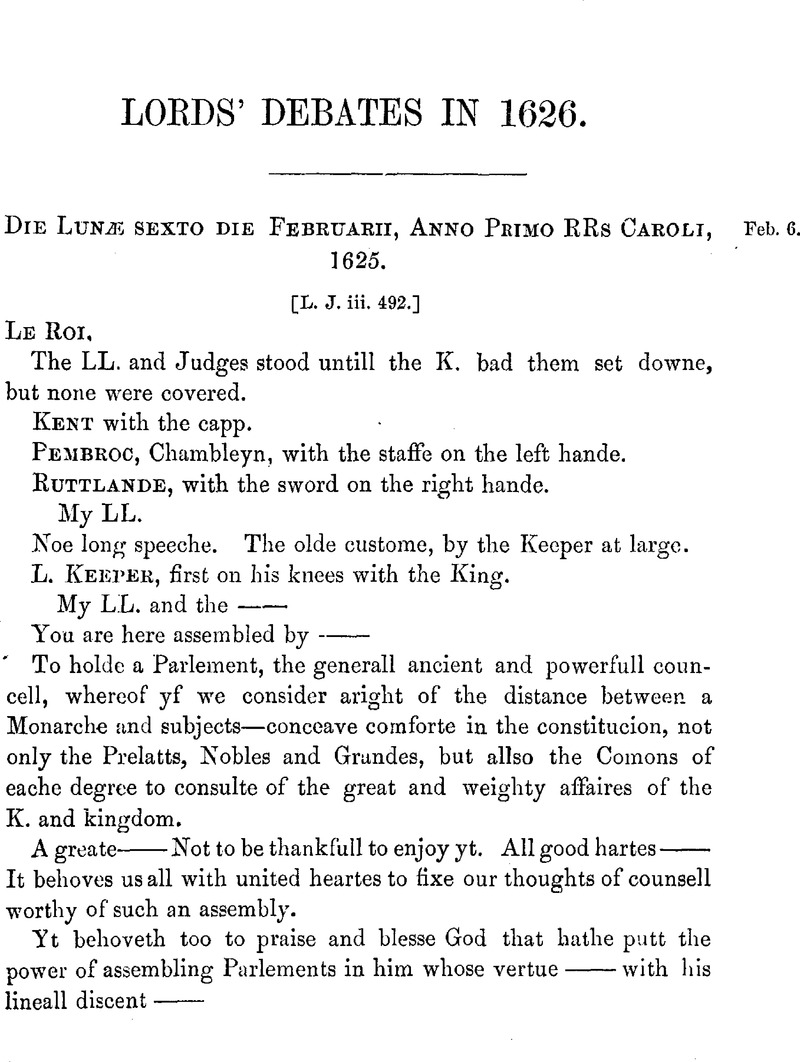No CrossRef data available.
Article contents
Lords' Debates in 1626
Published online by Cambridge University Press: 24 December 2009
Abstract

- Type
- Lords' Debates in 1624 and 1626
- Information
- Copyright
- Copyright © Royal Historical Society 1879
References
page 117 note a The words in italics were substituted for “they.”
page 121 note a One of the claimants of the Earldom of Oxford.
page 122 note a Small arms.
page 123 note a “know the”
page 129 note a This is followed by ‘The order made yesterday for a return of precedents suspended, but noe order to.”
page 130 note a In the MS. penstrokes have been drawn through this and Carlisle's speech, and “The Comittee to proceed” is written after Carlisle's speech.
page 133 note a La Manche, the Channel.
page 140 note a The words which follow, “and soe dyd others,” are deleted in the MS
page 140 note b See p. 129, notea.
page 140 note c Three forms of the question are here inserted, hut are scratched out with the pen.
page 143 note a The question is much altered by interlineations and corrections from its original form, but the only change of importance is the substitution of the last words for “or breache of the peace.”
page 147 note a Page 134.
page 147 note b “to commanded,” MS.
page 148 note a “this amongest,” MS., the first word being left unerased by mistake.
page 149 note a MS. “hee,” &c, the “hee” being inserted above the line in the wrong place.
page 155 note a “to trial,” or some such words, appear to be omitted.
page 156 note a “Resumed” is added here in the MS., but it should no doubt have keen erased when the word was entered lower down.
page 159 note a i.e., with the Spaniards
page 165 note a Perhaps “concur.”
page 170 note a i.e. He thinks it ought to be here.
page 173 note a Apparently “not” is omitted here.
page 174 note a The Duke of Lennox.
page 174 note a The Marquis of Hamilton.
page 180 note a In the MS. “touchinge” has been left unerased before “for” inserted above the line.
page 183 note a These two words are erased by a pen-stroke, evidently by mistake.
page 185 note a for redemption of prisoners from the Sallee rovers.
page 188 note a Left blank in MS.
page 194 note a Here follows, carefully erased with a thick penstroke:—
“DORSETT. The Prologue. Spea[ker], having spoaken of the deathe of the late Kinge, added: “I am commanded by the House of Comons to take care that nothinge myght reflecte uppon the honour of the deceased K[ing], nor the K[ing] nowe lyying.”
In the margin is: “The E[arl] of Dorsett says he wyll sett this downe himselfe.”
page 196 note a “mant” in MS.
page 198 note a I think the letter is an “E,” but I am not certain. If so, it means, I suppose, the reporter, the Earl of —.
page 203 note a “Resolved,” MS.
page 203 note a Here follow these words erased.: “SAY. Yt was agreed, noe L. to sytt here duringe the tyme his owne buissiness is in debate. Moved, the Duke to putt in his.”
page 207 note a This word is preceded by “Bristoll called to the barre agayne, but.” Erased, without anything else being substituted.
page 213 note a Repeated twice in MS.
page 213 note a Word obliterated by a blot.
page 217 note a There is a blank in the MS.
page 225 note a A penstroke is drawn through the words “Essex. That,” prohably by mistake. The idea meeting with no favour, Elsing may have intended to obliterate the speech, but on second thoughts inserted the marginal note instead.
page 231 note a The petition is copied into the book, near the end, amongst a number of blank pages, and is as follows:—
“15to Junii, 1626.
“May yt please your most excellent Matie. We, your Mats humble and feithefull subjects, the Peeres of this Kingedome, havinge receaved this morning a message from your Matie, intimatinge an intention to dissolve your Parlement, and remembringe that we are hereditarilye your Mats greate Conncell of this Kingedome, doe conceave that wee cannot deserve your Mats gracious opynion expressed in this message unto us, nor discharge our duitye to God, your Matie, and our countrey, yf, after the expression of our greate and universall sorrowe, we dyd not humbly offer our feithfull and loyall advyse to contynewe this Parlement, by which those greate and apparent daungers bothe at home and abroade, and signifyed unto us by your Mats commaunde, may be prevented, and your Matie made happye in the duitye and love of your people, which wee holde the greatest safetye and treasure of a Kinge; for the effectinge wherof our humble and feithefull endeavours shall never be wantinge. (Exr) “H. Elsyngb.”
Reade and approved of generally, but not presented to the Kinge, for his Matie refused to heare of any, &e. Commaunded that this be not entred.




